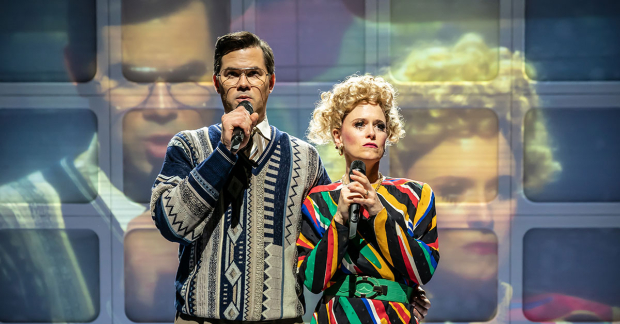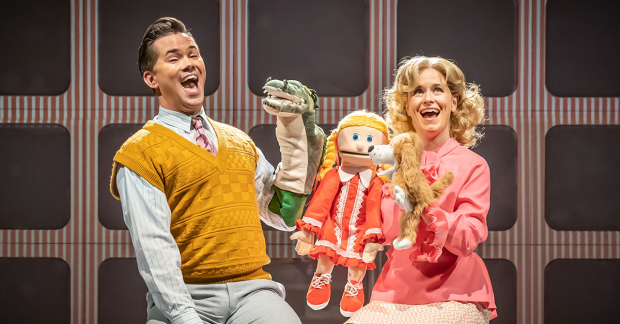”Tammy Faye” review – divine work from Elton John, Jake Shears and James Graham in new musical

© Marc Brenner
Its success, grounded in a terrific central performance by Katie Brayben, lies in the way Graham shapes a fairly straight-forward retelling of Tammy Faye’s life into something richer by using it to chart the rise of the evangelical right in American politics. As rival evangelist Jerry Falwell grasps the potential of using the rise of Ronald Reagan to bring back conservative values, Tammy Faye with her warm-hearted belief in the love of God rather than his wrath, becomes an unlikely heroine of liberal tolerance and equality.
The famous moment when she interviewed a pastor with AIDS, offering him understanding becomes a central scene; in life, she interviewed him via a video link, here Graham allows her the validation of a hug, shocking to her enemies, a blazing moment of compassion for the gay men whose cause she championed.
There is perhaps too much affection for Tammy Faye in the show as a whole. Certainly her extravagance and blindness to the massive fraud that her husband and business partner Jim undertook, which eventually landed him in jail go relatively unexamined and unchallenged. The subplot of Bakker’s own gay tendencies is never explored.
But that’s not really its purpose. This is a vibrant, multi-coloured telling, of an astonishing, mascara-coated life, riding the wave of television – “the light of the world is electric,” sings preacher Billy Graham as he launches the idea of TV evangelism – to go from small-town Christian puppeteers to the fastest growing ministry on earth, via Ted Turner’s Praise the Lord satellite channel. The impact of that period of 1970s and 1980s evangelism is still being felt today.
John’s songs, and Shears’ witty lyrics, chart this journey with considerable style. John already has The Lion King and Billy Elliot under his belt when it comes to hit musicals. This isn’t in the same league, but it is never less than enjoyable, as he cleverly varies the tone of the songs from power-pumped rock, with elegant piano lines, through jazzy riffs as the rival evangelists get jealous of Jim and Tammy Faye’s success, to the gospel-tinged retribution and repentance of the second act.

© Marc Brenner
Director Rupert Goold, and choreographer Lynne Page bring considerable flair to the delivery of each number. Bunny Christie’s set of a wall of TV screens enables clever effects – the Pope, the Archbishop of Canterbury and the head of the Mormon Church pop out at one stage to discuss whether “a bunch of Americans in ugly jackets holding microphones” can really cause a crisis of faith. But it also functions as a way of magnifying faces in close-up.
In the case of Katie Brayben’s Tammy Faye every nuance is worth catching. She may be wigged and made up to the nines (courtesy of Sharon Trickett), but it’s not just her appearance that is so beguiling. With her powerful voice (heard previously in the Carole King musical Beautiful), she owns the stage, capturing without irony the simplicity of Tammy Faye’s faith and the fallibility of her character. She makes you believe in her essential decency and in her final number, “If You Came To See Me Cry”, her admirably defiant courage.
Around her, the semi devil does get some of the best tunes, with Zubin Varla wrenching every last shred of meaning from Falwell’s constant machinations – “I’ve been at the forefront of the most successful reintroduction of conservative morality into America since the Puritans landed at Plymouth Rock”. As Jim Bakker, always the least clever man in any room, Andrew Rannells conveys some saving grace in a man who undoes his own success by greed. “I thought that it was God’s voice callin’/But someone else was on the line”, as Shears’ lyrics put it.
It’s not a show of great depth, but it has enormous panache and verve as it whisks through its strangely significant tale. I really enjoyed it.












